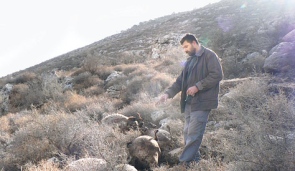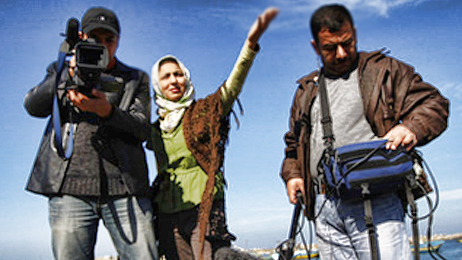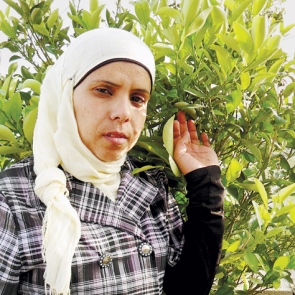
| THINK-ISRAEL |
| HOME |
November-December 2010
Featured Stories |
Background
Information |
News On The Web |

On Sunday December 19, the self-proclaimed "Israeli human rights" group B'tselem disseminated a shocking story to the local and international media. B'tselem claimed that the previous day Palestinian shepherd Samir Bani Fadel was peacefully herding his sheep when he was set upon by a mob of Israeli settlers. He alleged that these kippah-clad Israelis drove up in a car and chased him away. Then they torched the pasture and burned 12 pregnant ewes alive and badly burned five others. B'tselem furnished reporters with graphic photos of the dead sheep.
While the media published the account without a shred of suspicion, the police found Fadel's account hard to believe. Observant Jews neither drive nor light fires on Saturdays.
And indeed, when questioned by police investigators, Fadel admitted
he made the whole attack up. He accidentally killed his herd himself
when he set fire to a pile of bramble. Too embarrassed to admit his
mistake, he decided to blame the Jews and become a local hero.
B'tselem was only too happy to spread his lies.
On January 3, Channel 2 aired a video produced by B'tselem. The video purported to show residents of Yitzhar -- a community in Samaria — throwing rocks at Palestinians from the neighboring village Bureen for no reason whatsoever. Channel 2 presented the footage as further proof — if anyone needed it -- that the Israelis who live in Judea, Samaria and eastern Jerusalem are a bunch of lawless, hate-filled, violent fanatics.

Unfortunately for B'tselem and Channel 2, Yitzhar residents also own a video camera. And they also filmed the event. The Samaria Regional Council released the video to the media on Tuesday.
The Yitzhar video exposes the B'tselem video as a complete fraud. As it happened, on Monday afternoon a group of Palestinians joined by Israelis and/or foreigners descended on Yitzhar and attacked its residents with bricks and rocks of all sizes. Among the assailants was the cameraman who shot the footage presented on Channel 2. Not only did the videographer — who has blond hair — participate in the violent assault on Yitzhar. He staged the incident by alternately throwing rocks, filming, and directing his fellow attackers where to throw their rocks.
The Jews of Yitzhar only began throwing rocks to fend off their attackers.
This past Saturday the Palestinians' invented what has all the trappings of a new blood libel against Israel.

Every Friday Israeli anti-Zionist activists, Palestinian Authority employees, and foreign anti-Israel groups join forces at Bil'in. Together they attack IDF soldiers guarding construction of the separation barrier adjacent to Bil'in village.
Saturday, the PA claimed that Jawaher Abu-Rahmeh, a woman from Bil'in died from tear gas inhalation at the previous day's riot. The PA's chief negotiator Saeb Erekat claimed that her death was an IDF war crime.
Erekat of course, has not distinguished himself as a paragon of truthfulness. To the contrary. He has a long track record of spreading lies about Israel on the international stage. In just one notable example, in April 2002, Erekat claimed in multiple television appearances that the IDF killed more than 500 people at Jenin refugee camp during Operation Defensive Shield. He also claimed that the IDF buried some 300 people in mass graves.
The UN later reported that during the pitched battle in Jenin refugee camp, 52 Palestinians were killed. 23 IDF soldiers were killed in the battle.
Despite Erekat's rich history of lies, B'tselem's Executive Director Jessica Montell joined his bandwagon immediately. As NGO Monitor documented, in a Twitter post on Saturday, Montell wrote, "Sad start to the year. Jawaher Abu Rahmeh died this morning after inhaling tear gas yesterday in Bil'in demonstration."
Her claim was echoed in similar statements from her fellow Israeli anti-Zionist pressure groups. Anarchists Against the Wall, Yesh Din, Gush Shalom, Physicians for Human Rights-Israel, and attorney Michel Sfard who is associated with Yesh Din, Al Haq and Breaking the Silence all alleged that the IDF murdered Abu Rahmah with tear gas.
As luck would have it though, eyewitnesses say that Abu Rahma didn't even participate in the weekly riot. Ilham Abu Rahma, her 19 year old cousin and neighbor told Britain's Independent that the deceased was at home when the riot took place.
For its part, the IDF has reported that the medical information it received about Abu Rahma's death are not consistent with death through overexposure to tear gas. During her hospitalization, Abu Rahma received an unusual mix of drugs that is usually only administered to treat poisoning, drug overdose or leukemia. The IDF also revealed that Abu Rahma had been recently hospitalized at a Palestinian hospital.
The easiest way to determine what caused Abu Rahma's death would of
course have been to perform an autopsy. The IDF asked for one to be
performed. But the PA refused the request and instead buried her in
record time.
The Sad truth is that a case can easily be made that all of this might have been avoided if B'tselem hadn't taken it upon itself to delegitimize Israel's right to self-defense. As part of its efforts, in 2002 B'tselem spearheaded the international campaign against Israel's right to build the separation fence to keep Palestinian suicide bombers out of its major cities.
As NGO Monitor's recent in-depth report about the lawfare campaign to use the language of law to criminalize Israel shows, B'tselem was the first NGO to launch a campaign against the security fence. It coined the draconian term, "The Wall" to define the barrier which is in most places nothing more than a wire fence. NGO Monitor recalls that in 2002 and 2003 B'tselem "issued two lengthy position papers, which became accepted as the definitive analyses of 'the Wall' and were widely adopted."
B'tselem's campaign against the security fence was quickly joined by other NGOs, the UN and the EU. Its allegations formed the basis of the international campaign to delegitimize Israel's right to build the barrier.
That campaign reached a high point in 2004 with the publication of International Court of Justice's opinion on the matter. The ICJ's opinion parroted B'tselem's charge that Israel has no right to defend itself from Palestinian aggression. So too, the "evidence" against Israel's right to defend itself submitted by the PLO was based largely on the two B'tselem reports.
If B'tselem hadn't launched the campaign against the fence, it is possible that Israel's decision to built it might have been greeted with the same indifference as the security fences erected by the likes of India, Spain and numerous other countries in disputed territories. That is, it might have been seen as the legitimate act of self-defense it is.
The central role that B'tselem and its anti-Zionist comrades in the Israeli NGO community play in the international political war being waged against Israel's right to exist first came under significant public scrutiny following the publication of the UN Human Rights Committee's Goldstone report on Operation Cast Lead in 2009.
As NGO Monitor and the Zionist student movement Im Tirtzu demonstrated last year, B'tselem and 15 other Israeli NGOs funded by the New Israel Fund and foreign governments lobbied the UN Human Rights Council to form the Goldstone Commission with the clear agenda of criminalizing Israel and whitewashing Hamas's war crimes against the Jewish state. Moreover, B'tselem and its fellow-NIF grantees, provided 92 percent of the anti-Israel allegations originating from Israeli sources. These allegations — most of which were firmly denied by the IDF — were used by Judge Richard Goldstone and his colleagues to "prove" that Israel committed war crimes in prosecuting its campaign to protect southern Israel from Hamas's illegal missile onslaught. them were combatants. As NGO Monitor notes, the Goldstone report's claim that "Only one of every five [Gazan] casualties was a combatant," clearly was based on B'tselem's numbers.
The IDF — which B'tselem and its comrades claim has no credibility — reported that of 1166 Palestinian deaths, 709 were fighters killed in combat. Goldstone dismissed the IDF data.
Yet in November, Hamas's "Interior Minister" Fathi Hamad admitted to the London-based Al Hayat newspaper that the IDF's numbers were far more accurate than B'tselem's. According to Hamad, 600-700 Hamas fighters were killed in Cast Lead.
One of the reasons that false stories by the likes of B'tselem and its fellow Israeli-staffed anti-Zionist pressure groups are treated with respect by the local media and the international community alike is because they are perceived as Israeli groups. Why would Israelis lie about their own army?
Wednesday the Knesset voted to form a commission of inquiry to examine these groups' sources of funding. The rationale behind this parliamentary investigation is clear. The time has come to determine just how "Israeli" these organizations that form such an integral part of the international political war against Israel actually are. How much of their funding comes from foreign governments? And if their foreign funding is significant, then how can they claim to be Israeli groups?
B'tselem for instance receives funding from the British, Swiss, and Irish governments, Christian Aid, the Ford Foundation, DanChurchAid, (funded by the Danish Government), Diakonia, (funded by the Swedish and Norwegian governments and the EU), Trocaire, (funded by the Irish and UK governments), and others.
Yesh Din, which specializes in conducting domestic lawfare against the IDF is funded by the Irish, Dutch, British, German, and Norwegian governments, the EU, and George Soros' Open Society Institute.
Physicians for Human Rights-Israel, Breaking the Silence, Bimkom, Peace Now, Gush Shalom, Adalah, the Geneva Initiative, the Committee for Peace and Security and so on and so forth all receive massive funding from foreign governments. The Samaria Regional Council alleges that over the past decade, foreign governments have donated hundreds of millions of euros, dollars and shekels to these Israeli "grassroots" groups.
The fact is that these groups' claim to grassroots' status is as credible as their allegations of Israeli criminality and Palestinian victimhood. In truth, these NGOs are local agents of foreign governments who use them to advance their anti-Israel policies.
The Knesset's move to investigate these groups was greeted by righteous rage from the groups' leaders and sympathetic Leftist Knesset members. The Knesset's decision was castigated as "McCarthyite," and "anti-democratic." But it is clear these groups and their parliamentary allies doth protest too much.
No one is talking about shutting them down. But the public has a right to know what these groups really are. And our political representatives have an obligation to investigate and expose subversive foreign agents. Israel and Israel's democratic system is weakened, not strengthened when the state's international reputation and domestic discourse is hijacked by foreign governments who hide behind their Israeli foot soldiers.
Caroline B. Glick is the senior Middle East Fellow at the Center for
Security Policy in Washington, DC and the deputy managing editor of
The Jerusalem Post.
This article appeared Jan. 7, 2011/2 Shevat, 5771,
in Jewish World Review
http://www.jewishworldreview.com/0111/glick010711.php3
| HOME | November-December 2010 Featured Stories | Background Information | News On The Web |